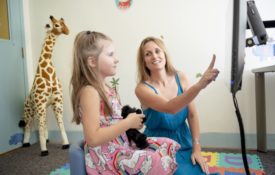-
The Very Serious Science of Humor
To find mirth in the world is to be human. No culture is unfamiliar with humor, according to Joseph Polimeni, an associate professor of psychiatry at the University of Manitoba. For someone who analyzes humor, Polimeni tells me he’s still surprised by its complexity: How words and phrases and jokes have different meanings to everyone, but we all have the instinct to laugh. Just as humans have an innate ability to understand language, Polimeni says, so, too, do they have a reflex for comprehending everyday comedy. Sure, there are people who are better suited at making others laugh, but “almost everybody,” Polimeni tells me, can appreciate a quip.
-
Moral Injury Is an Invisible Epidemic That Affects Millions
In early 2021 emergency room physician Torree McGowan hoped the worst of the pandemic was behind her. She and her colleagues had adapted to the COVID-causing virus, donning layers of protection before seeing each patient, but they’d managed to keep things running smoothly. The central Oregon region where McGowan lived—a high desert plateau ringed by snow-capped mountains—had largely escaped the first COVID waves that slammed areas such as New York City. Then the virus’s Delta variant hit central Oregon with exponential fury, and the delicate balance McGowan had maintained came crashing down.
-
‘How Do We Know Ourselves?’ Review: A Humbling Look Inside
The title of “How Do We Know Ourselves? Curiosities and Marvels of the Human Mind” suggests that Hope College psychologist David Myers will, in this brief book, focus primarily on the process of self-discovery. But a better title might have been “How Well Do We Know Ourselves?” The answer that emerges, over 40 charming and clear-eyed chapters that cover disparate areas of psychology including memory, relationships and personality, is: not very. Consider a study on dissent. A huge majority of the participants—95%—predicted that they would immediately protest sexist comments in a hypothetical group scenario.
-

Apply for the National Institutes of Health Early-Stage Investigator Paper Competition
The Matilda White Riley Early Stage Investigator Paper Competition recognizes emerging scientists whose research reflect Dr. Matilda White Riley’s vision of research excellence in health-related behavioral and social sciences.
Visit Page -

New Research From Clinical Psychological Science
A sample of research on threat expectancy, improving treatment outcomes for PTSD, the correlation between mood and executive function, COVID-19 and mental health, and much more. Visit Page
-

Four Scholars Pursue Diverse Research Through Cattell Sabbatical Awards
Kenneth Bollen, Jessica Cantlon, Kevin Myers, and Kristin Shutts will extend their sabbatical research in topics ranging from primate cognition to food insecurity. Visit Page

